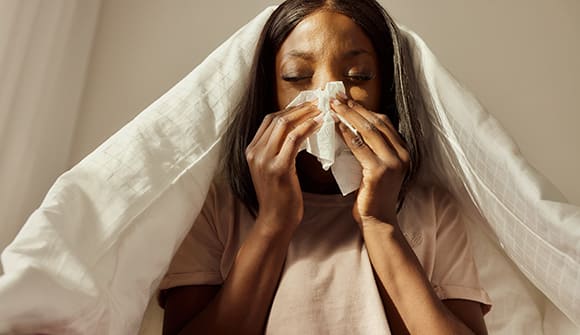New flu
The subclade K strain is circulating ahead of the holidays.
Article Author: Juliette Allen
Article Date:

A new strain of the flu virus is circulating throughout the United States, just in time for holiday gatherings with the family.
The variant, known as influenza subclade K, is now the dominant strain in the United States and has already driven flu spikes in other countries like Canada, Japan and the United Kingdom, according to Shalika Katugaha, MD, system director of Infectious Diseases for Baptist Health.
“The influenza virus frequently mutates, resulting in new variants and subclades each season,” she explained. “This particular strain is a mutated version of the H3N2 flu virus."
Symptoms of subclade K
This new strain is known for causing sudden onset of symptoms, including:
- Fever
- Chills
- Body aches
- Headache
- Fatigue
- Congestion
- Runny nose
- Cough
“Historically, influenza A (H3N2) seasons are associated with higher hospitalization and mortality rates in older adults. The concern is that subclade K, as a mutated H3N2, will follow that pattern, resulting in a more severe flu season,” Dr. Katugaha said. “Health officials residing in areas where the subclade K variant has become dominant have reported serious illnesses, especially in vulnerable populations like the elderly and young children.”
Is the flu shot a match?
According to Dr. Katugaha, because this year’s flu vaccine was updated in March 2025 to target the strains predicted at that time to be the most prevalent, it’s not a match for subclade K, which only appeared recently.
“The virus mutations have lessened the effectiveness of the vaccine, leading to updated recommendations for the next season,” she explained. “That said, the vaccine still provides substantial protection, especially against severe outcomes and hospitalizations. Additionally, this year's flu shot is expected to match the circulating H1N1 and influenza B strains well.”
She added, “It’s not too late to get the flu vaccine. It typically takes the body two weeks to develop immunity, so plan to get it as soon as possible!”
Enjoy flu-free holidays
Because the holiday season coincides with cold and flu season, Dr. Katugaha provided some additional tips to keep your holidays free from the flu:
- Wash your hands frequently and thoroughly
- Clean commonly touched surfaces
- Stay home if you’re sick
“Certain high-risk individuals may benefit from a prophylactic antiviral treatment if they’re exposed to the flu,” Dr. Katugaha added. “Talk to your primary care physician if you’d like to learn more.”
Have you gotten your flu shot? Whether you need a vaccine or fall sick with the flu, your primary care physician can help. To find the right provider for you, click here or schedule an appointment online.



